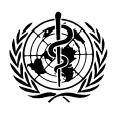THE WORLD HEALTH ORGANIZATION (WHO)

BACKGROUND: In taking the pulse of global health in 1974, WHO member states concluded that despite vaccines, antibiotic drugs, and a host of extraordinary advances in medical technology, the world was far from healthy. There was a "signal failure," the 27th World Health Assembly concluded, to provide basic services to two-thirds of the world's population, particularly to rural inhabitants and the urban poor, who, despite being the most needy and in the majority, were the most neglected. That assessment—made 24 years after WHO's establishment—led to a reorientation of WHO's outlook and to the adoption of the goal of "health for all by the year 2000" through the approach of primary health care. Although WHO's great achievement remained the eradication of smallpox, the HIV/AIDS pandemic and a virulent resurgence of preventable diseases like malaria and tuberculosis posed grave challenges to the goal of "health for all" as the 21st century dawned. The main task of WHO since its founding has been to work to ensure that people everywhere have access to health services that will enable them to lead socially and economically productive lives.
BIBLIOGRAPHY
Bulletin of the World Health Organization. The principal scientific periodical of WHO; monthly.
International Travel and Health: Vaccination Requirements and
Health Advice. Annual guide.
Pharmaceutical Newsletter. Monthly.
Weekly Epidemiological Record. Contains notifications and other information relating to diseases designated as "quarantinable" in the International Sanitary Regulations. For the guidance of national health administrations and quarantine services.
WHO Drug Information. A quarterly journal with reports on major drug regulatory action in different countries and information on medicinal products and selected essential drugs from WHO's Model List.
World Directory of Medical Schools. Country-by-country directory of more than 1,600 institutions.
World Health Reports . Examines global health by focusing on a specific theme, while assessing the current global health situation; annual.
(A complete listing of WHO publications and periodicals can be accessed and searched at the WHO web site www.who.int/ .)